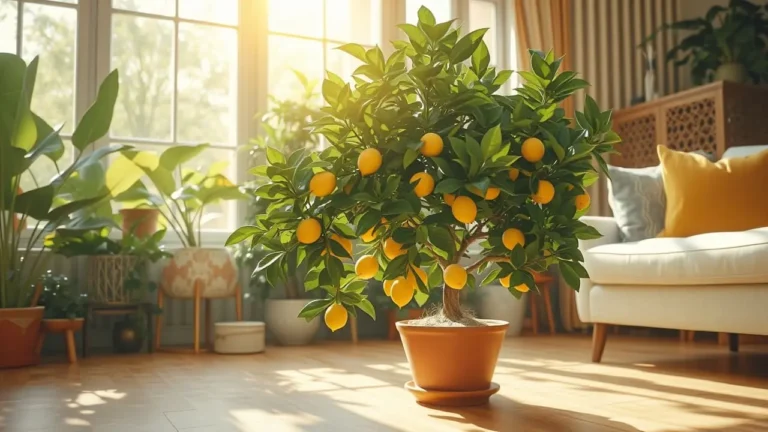Dwarf Lemon Trees: The Ultimate Guide to Growing
Learn how to grow dwarf lemon trees indoors and outdoors with this comprehensive guide. Discover essential care tips, benefits, and how to enjoy fresh lemons from your own compact tree.
Table of Contents

1. Introduction
Dwarf lemon trees are an excellent way to bring fresh, tangy fruit into your home or garden, even if you have limited space. Whether you’re an experienced gardener or just starting out, these compact trees are easy to grow and offer plenty of benefits. In this article, we’ll explore everything you need to know about dwarf lemon trees, from what they are to how to care for them. By the end, you’ll be ready to cultivate your own little citrus orchard!
2. What are Dwarf Lemon Trees?
Dwarf lemon trees are miniature versions of standard lemon trees that have been specially bred to thrive in small spaces. Unlike their full-sized counterparts, which can grow up to 20 feet tall, dwarf lemon trees typically reach a height of 3-6 feet, making them ideal for container gardening or small garden spaces. They produce the same delicious lemons as regular lemon trees but on a smaller scale, making them perfect for urban environments, patios, or even indoor growth.
Key Features of Dwarf Lemon Trees:
- Compact size: Ideal for small spaces like apartments, patios, or balconies.
- Fruit production: Despite their small size, they yield full-sized lemons.
- Versatile growth: Can be grown indoors or outdoors, depending on your climate.
3. Benefits of Growing Dwarf Lemon Trees
There are many reasons why you should consider growing a dwarf lemon tree. Here are a few key benefits:
- Fresh, Homegrown Lemons: Nothing beats the taste of fresh lemons straight from your tree. Whether for cooking, making lemonade, or adding flavor to drinks, you’ll always have a supply of this essential fruit.
- Air Purification: Like most plants, lemon trees improve air quality by absorbing carbon dioxide and releasing oxygen. Having a dwarf lemon tree indoors can contribute to a cleaner, healthier environment.
- Low Maintenance: Dwarf lemon trees are relatively easy to care for, making them a great choice for beginners.
- Aesthetic Appeal: These trees are not only functional but also add beauty to any space with their glossy leaves and fragrant blossoms.
4. How to Grow Dwarf Lemon Trees
Growing dwarf lemon trees is easier than you might think. Here’s what you need to get started:
4.1 Choosing the Right Location
The first step to growing a healthy dwarf lemon tree is choosing the right location. Lemon trees need plenty of sunlight to thrive, so you’ll need to find a spot that gets at least 8 hours of direct sunlight per day.
- Indoors: Place your dwarf lemon tree near a south or west-facing window for maximum sunlight.
- Outdoors: Choose a sunny, sheltered spot in your garden or on your patio where the tree will be protected from strong winds and extreme cold.
4.2 Planting Tips for Success
- Soil: Use well-draining, slightly acidic soil to help the tree thrive. Citrus trees don’t like standing water, so good drainage is essential.
- Container: If growing in a pot, choose a container that is at least 18 inches in diameter and has drainage holes. This allows the roots to spread out and prevents waterlogging.
- Spacing: If you’re planting outdoors, space your dwarf lemon tree at least 4 feet from other plants to give it room to grow.
5. Caring for Dwarf Lemon Trees
Proper care is crucial to ensure that your dwarf lemon tree stays healthy and productive. Here are some essential care tips:
5.1 Watering and Fertilizing
- Watering: Dwarf lemon trees prefer consistent moisture but not soggy roots. Water when the top inch of soil feels dry to the touch. During the growing season, they may need water every 2-3 days, but less frequently during the winter months.
- Fertilizing: Use a balanced, slow-release fertilizer to feed your tree every 6-8 weeks during the growing season. A fertilizer specifically designed for citrus trees is best.
5.2 Pruning and Maintenance
- Pruning: Regular pruning helps maintain the shape of your tree and encourages better fruit production. Remove dead or damaged branches and trim any growth that is too tall or out of shape.
- Maintenance: Keep the soil well-aerated, and ensure your dwarf lemon tree is not crowded by other plants, which can lead to disease or pest problems.

5.3 Common Pests and Diseases
Like any plant, dwarf lemon trees are susceptible to pests and diseases. Some common issues include:
- Aphids: These small insects suck sap from the tree, causing the leaves to curl. Use an insecticidal soap to treat the problem.
- Spider Mites: These tiny pests can cause yellowing and leaf drop. Insecticidal soap or neem oil can help control them.
- Root Rot: Overwatering is a common cause of root rot, which can kill your tree. Ensure proper drainage and avoid watering too frequently.
6. Harvesting and Using Your Dwarf Lemon Tree
Once your dwarf lemon tree starts producing fruit, it’s time to harvest! Here’s how to know when your lemons are ready:
- Color: The lemons should be fully yellow when ripe. They will feel slightly firm but yield slightly when gently squeezed.
- Size: Dwarf lemon trees produce smaller fruits, but they should still be a good size compared to store-bought lemons.
After harvesting, you can use your fresh lemons in a variety of ways:
- Culinary Uses: Use them for cooking, baking, or making refreshing beverages.
- Lemon Juice: Squeeze fresh lemon juice for lemonade or to add a zesty flavor to your dishes.
- Lemon Zest: Grate the skin for a burst of citrus flavor in your recipes.
7. Conclusion
Dwarf lemon trees are a fantastic choice for those looking to grow their own fresh fruit in small spaces. Whether you’re growing them indoors or outdoors, they’re easy to care for and offer numerous benefits, including fresh fruit, improved air quality, and aesthetic appeal. By following the care tips and guidelines provided in this article, you’ll be well on your way to enjoying homegrown lemons year-round. So, why not give it a try and add a dwarf lemon tree to your garden or home today?
Share this article with fellow gardening enthusiasts, and explore our other content on growing fruit trees in small spaces, by visiting MyGardenPure.com.

